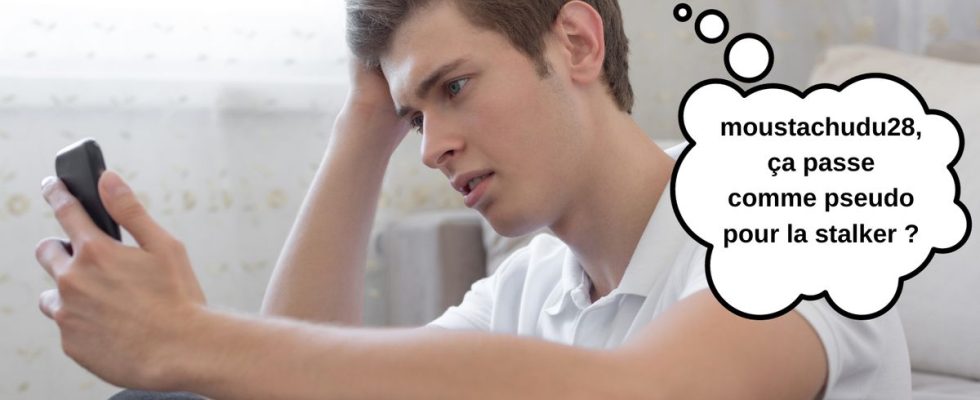The breakup… The sobs, the hours rehashing the past, rereading old conversations with his ex and… those spent stalking him – spying on him on social networks. In a study * published this Thursday, Ifop shows how 15-34 year olds manage their relationship with their ex online. If some figures are not surprising (nearly nine out of ten people surveyed spied on their ex on the networks in the month following their breakup), others are more frightening. For example, 29% of people surveyed have already created a fake profile to spy on their former partner.
Should we be worried about these numbers? Are we all potential toxic exes? At what point does this behavior become problematic (for our own mental health, but also for that of our ex)? We asked Claire Petin, clinical psychologist and psychotherapist, the question.
In this study, nearly nine out of ten people surveyed said they had spied on their ex on social media during the month following their breakup. Stalking seems to have become a common practice. But is it healthy?
It has indeed become normal, but just because it’s normal doesn’t mean it’s healthy. Stalking your ex on the networks can be understandable. We can maintain a legitimate curiosity by wanting to know what happens to this person who was important to us.
On the one hand, this can allow you to gently detach yourself and after a while lose interest in spying on him. But it can also have a perverse effect. We can’t cut the cord, we stay glued to the lookout for a new publication, we look at who our new followers are. This can maintain the illusion of a relationship that no longer exists, and therefore make separation more difficult.
And continuing to comment and like your posts on the networks, is that healthy?
This can be a cordial way of saying “I’m not mad at you”, “I continue to be interested in what’s going on in your life”. But it can also be oppressive for the ex in question. And if it’s done in order to attract his attention, it can be bad for ourselves, because it feeds the hope that he will regain an interest in us.
When does stalking become problematic, both for one’s own mental health but also for that of others?
It’s problematic for oneself when it becomes obsessive. When it’s a reflex, that every day, or several times a day, you check your ex’s networks. It’s not just a matter of checking them from time to time but really scrutinizing, analyzing the number of followers, going to see who is the person I don’t know and who is tagged in a photo. In fact, when we really start to waste time, when it takes up a lot of space, when it becomes a source of rumination, when it negatively affects morale. It can even go further. We can neglect ourselves, our social life.
Then, if the person continues to interact even though their ex has clearly said they no longer want contact, this can be experienced as harassment. This can generate anxiety, even fear, in this person who feels spied on, who has the impression of losing freedom or of still having accountability.
Nearly one in three people surveyed have already created a fake profile to spy on their former partner. Is this worrying?
We’re not going to be alarmed for nothing. It’s not the creation of fake profiles that’s the problem, but what we do with them. If it’s just to look at what he posts, it’s not healthy, but it’s not a big deal in itself. On the other hand, if, with my fake profile, I start a conversation with my ex by pretending to be someone else, that’s more serious.
The study also shows that after the breakup, as the months pass, this practice declines. Does this mean that if we continue to do it long after the relationship ends, it’s problematic?
There is no normal length of time for grieving a relationship. The duration plays a role, but it mainly depends on what you feel. Feeling jealousy, sadness, anger, or shame right after the breakup is not abnormal. On the other hand, if it continues to be obsessive several months later, we can start to ask ourselves questions.
This is often a sign that there are underlying problems, such as narcissistic flaws in the person who is stalking. If we have this reflex, it can also reveal a form of loneliness. So don’t hesitate to talk about it with loved ones. Or be accompanied by a therapist to gradually detach yourself.
You are talking about underlying issues. What can this intensive practice hide?
There may be an anxious, insecure type of attachment. When we have a secure type of attachment, we accept breakups. Even if it’s hard, it doesn’t put us in a bad state. When you have an anxious attachment style, it can cause wounds of abandonment and rejection to re-emerge, with false beliefs such as “I am not worthy of being loved”, “he will necessarily prefer someone else ”, and we continue to stalk to verify this. In this case, it is therefore necessary to work on self-esteem and self-confidence.

